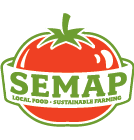FOOD SAFETY
Want to view current regulations to food safety?
Check out food and agriculture policy here: Northeast Center to Advance Food Safety (NECAF), Food and Drug Administration (FDA), and National Center for Appropriate Technology. Understand your farm’s liability regarding and minimize food safety risks with Farm Commons. Note that these sources are not comprehensive and you should consult with your local Board of Health to be sure you are in compliance.
Seeking food safety courses or workshops?
Keep an eye out on our Events page for SEMAP workshops. Other organizations also host workshops and offer food safety support: Cornell Small Farms Program, National Young Farmers Coalition, and National Good Agricultural Practices (GAP).
Building your own cold storage facilities?
University of Vermont’s Extension for Agricultural Engineering offers a comprehensive guide to constructing a space to keep your products at a safe temperature.
PEST AND WILDLIFE MANAGEMENT
Looking for tips on identifying and controlling insect pests?
UMass Amherst Agricultural Extension has a pest scouting calendar and plant-family specific strategies that are specific to Massachusetts. Resources on organic management of regional insect pests are provided by Cornell University.
Experiencing crop or infrastructure damage from wildlife?
Agricultural damage from wildlife, also known as agricultural depredation, can be a big challenge for Massachusetts farmers. MassWildlife is available to offer guidance on how to minimize this damage. View MassWildlife’s resource page to review the options farmers have to lessen agricultural damage from wildlife, including farm landowner hunting permits and depredation permits.
SOIL HEALTH
Interested in better understanding soil health?
Get free one-on-one advice from fellow farmers through American Farmland Trust’s Healthy Soils Farmer Consultancy Program. Check out the new report from Endless Farm’s (Johnston, RI) Northeast SARE-funded project, Effect of an Indigenous Soil Microbial Inoculant on Soil, Soil Microbial Community, and Leaf Nutrient Density.
Composting on-farm?
View MDAR’s resource page for on-farm composting guidance, the registration for exemptions, and grant options.
DISASTER PREPAREDNESS
Preparing for a natural or manmade disaster?
Farmers increasingly have to be aware of disasters like hurricanes, flooding, wildfires, and extreme winter storms, alongside manmade emergencies like vehicle incidents, chemical exposure, and power failures. Templates and checklists for preparing your land, infrastructure, animals, and workforce for all types of emergencies are available through the Massachusetts Department of Agricultural Resources (MDAR), Occupational Safety and Health Administration (OSHA), Iowa State University, and PennState Extension.
DAY-TO-DAY FARM LOGISTICS
Looking for a more efficient harvest tracking method?
The following platforms & tips were crowd-sourced from farmers on the Eastern Mass CRAFT list: Google Forms linked to a Google Spreadsheet, Tend, AppSheet, Appy Pie, inFlow, farmOS, and Farmier. Some e-commerce platforms also have integrated harvest tracking methods. A recommended free crop-planning platform is Seedtime.
Curious about on-farm innovation?
Check out FarmHack, a farmer-led open-source guide to modified and improved farm tools. Also view reports from completed innovation projects through Northeast SARE.

